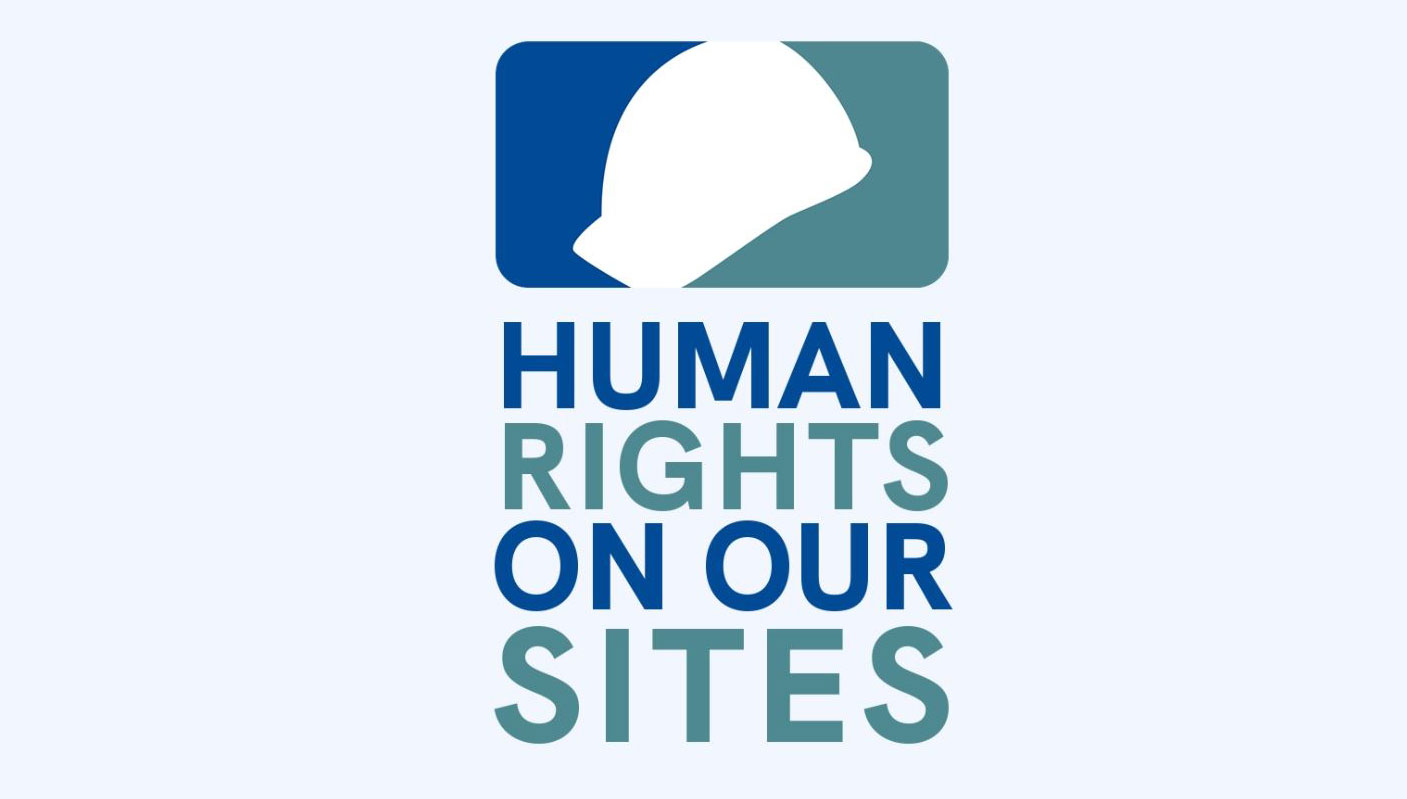Human rights
On this page
2011
First time integration of human rights in HOCHTIEF's Code of Conduct
2013
Inclusion of human rights topics in project trainings
2017
Initiation of quick checks for human rights
2018
HOCHTIEF Human Rights Risk and Capability Assessment
2019
Human rights stakeholder dialog
2020-2021
Initial risk analysis Division Europe
2021
Appointment of the Chief Human Rights Officer
2022
Initial risk analysis Division Americas; Integration of human rights issues in compliance audits
2023
Roll-out human rights e-learning; Extended risk analysis Division AsiaPacific
Standards
We are committed to clear and binding standards
As a global infrastructure company, operating under high social, environmental and ethical principles, HOCHTIEF is aware of its due diligence obligations and is committed to respecting and upholding all internationally recognized freedoms and human rights. The basis for this are:
- The Universal Declaration of Human Rights (UN, 1948)
- The International Covenant on Civil and Political Rights (UN, 1966)
- The International Covenant on Economic, Social and Cultural Rights (UN, 1966)
- The ILO Declaration on Fundamental Principles and Rights at Work and its follow-up Declaration (ILO Core Labor Standards, 1998)
- The UN Guiding Principles on Business and Human Rights (UN, 2011)
- The OECD Guidelines for Multinational Enterprises (OECD)
- The Due Diligence Guidance for Responsible Business Conduct (OECD)
- The ILO Tripartite Declaration of Principles concerning Multinational Enterprises and Social Policy (MNE Declaration, 2017)
- The UN Global Compact (UN, 1999)
- The UK Modern Slavery Act (2015)
- The Australian Modern Slavery Act (2018)
- The German Supply Chain Sourcing Obligations Act “Lieferkettensorgfaltspflichtengesetz” (2021).
We have expressed this clearly and bindingly in our internal principles. For example, the HOCHTIEF Code of Conduct, applicable to all our employees, and the HOCHTIEF Code of Conduct for Business Partners obliges them to comply with human rights. We have also reiterated our commitment to respecting human rights in our revised Position Paper. This is also reflected in our new guideline for business partners, "Human Rights - Our Requirements to You", which is also part of the supplier selection process in Europe.

HOCHTIEF Code of Conduct for Business Partners and Human Rights - Our requirements to you
PDF (3.2 MB)Commitment
Our Engagement addresses our own operations and those of our value chain
Many people are—in a direct or indirect way—part of our projects. HOCHTIEF bears responsibility for all of them. We avoid any situation that could have a negative impact on their wellbeing. This applies in particular to respect human rights along our entire value chain, as well as their health and safety. This applies not only to our own employees, suppliers, subcontractors and their subcontractors as well as joint venture partners, but also for example to those affected only indirectly by our projects, such as residents of nearby construction projects.
We have screened our potential subcontractors and suppliers with particular focus on those operating in countries with an increased risk of human rights violations. Through our HOCHTIEF Code of Conduct for Business Partners and the associated measures, we oblige our partners to enforce the same standards with regard to human rights, labour, social and environmental standards among their partners.
In addition, HOCHTIEF has expanded its supplier self-disclosure to include the topic of human rights—which we evaluate in a targeted manner—we aim to ensure that potential contractual partners meet our human rights compliance requirements in all of their actions.
HOCHTIEF continued to purchase materials and services for the most part in 2023 from subcontractors and suppliers with high human rights standards in accordance with the UN conventions. In the very few procurement countries where these conventions are not taken into account, we set our own requirements with our own standards.
Human Rights Corporate Management System
Human Rights Due Diligence Process
In order to prevent violations of human rights due diligence obligations, we first recorded potential human rights risks in our risk management system (Human Rights Corporate Management System) which is structurally based on the seven basic elements of our Compliance Management System.
In terms of an effective risk reduction, human rights and environmental rights are bundled into an overall system based on the different elements of culture, objective, risk, program, organization, communication and monitoring/improvement. The concretization of the elements is presented in the following Human Rights Circle:
The basis for identifying and managing human rights- and environment-related risks, which is specified among other things in the German Supply Chain Due Diligence Act, is the risk analysis. HOCHTIEF pursues a risk-based approach with the aim of identifying risks and potential negative impacts of business activities on respect for human rights at an early stage and taking appropriate countermeasures. In a first step, we carried out a risk-based top-down country analysis. This included the countries in which the Group is active. The results provide an overview of the human rights situation in the political, social and economic context of the respective country. In a second step, we conducted a bottom-up analysis of the individual business areas for our business activities.
To do so, we assigned the 30 articles of the United Nations Universal Declaration of Human Rights (UDHR) to the following 10 categories and then identified possible situations in which human rights could arise:
- Cultural Rights and intellectual property
- Data protection and privacy
- Decent employment and working conditions
- Freedom of expression
- Health and well-being
- Use of land and property rights
- Protection against discrimination and harassment
- Protection of physical integrity
- Avoidance of labor exploitation and modern slavery
- Transparency and anti-corruption
At the same time, we identified possible scenarios in which various social groups involved in the different phases of our projects could be exposed to human rights risks:
- HOCHTIEF Employees, including temporary andmigrant workers, students and any other type of worker.
- Value Chain Employees, including temporary andmigrant workers, students and any other type of worker.
- Business Partners and Customers: Public and private entities/companies that have commercial relations with HOCHTIEF, such as customers, suppliers, contractors, subcontractors, joint ventures, and further contractual parties (“partners”)
- Local Communities: include local residents living in the area surrounding our projects, users and civil society.
- Vulnerable Groups, including migrant workers, indigenous peoples and other minorities, youth, children, women and people with disabilities and/or reduced mobility.
We then discussed our preliminary results with the subsidiaries and representatives of the individual departments and deepened the findings in interviews (due diligence process). We also identified the measures that have already been taken and implemented to reduce the potential risks. For this purpose, we conducted an inventory of existing measures and processes in the most important functional areas (such as compliance, human resources, procurement, occupational health and safety and environmental protection) and assessed which of them can prevent or reduce the identified potential human rights risks.
Among other things, we agree on contractual clauses with suppliers, subcontractors and joint venture partners in which human rights due diligence obligations are regulated within the scope of the cooperation. We also train employees and communicate reporting options transparently. Furthermore we have identified which risks or social groups still need to be covered by improvement measures.
HOCHTIEF takes a risk-based approach to risk management. Based on the risk analysis and with the participation of all relevant departments, we have therefore identified the so-called salient human rights issues. These form the basis for the annual follow-up of the measures to be monitored and the reporting. We have identified the following seven Salient Human Rights Issues:
Measures
Prevent, Respond and Mitigate
The existing options for making a report of violations of laws or internal regulations via HOCHTIEF´s digital Whistleblower system and the external whistleblowing hotline of our ombudsman can also be used as a complaints mechanism for reporting (possible) human rights violations. These grievance mechanisms are public, anonymous, and accessible to all our stakeholders. Each person raising concerns can decide for themselves whether to make an anonymous report.
HOCHTIEF does not tolerate any pressure, coercion or reprisals against whistleblowers and intermediaries, but also all other persons who contribute to promoting compliant conduct at HOCHTIEF. Any whistleblower who does not intentionally or grossly negligently report false information is protected against reprisals of any kind that can be traced back—even if only indirectly—to the report. HOCHTIEF thus ensures that no whistleblower suffers any disadvantage in the company or in business dealings with HOCHTIEF as a result of complying with the law, regulations and internal company requirements.
The different reporting options are listed on our compliance website.
Sensitize our employees
Through the internal publication of our video on the treatment of human rights at HOCHTIEF, employees are made aware of this topic. In addition, the topic of human rights is subject of our WebTrainings as well as of our live trainings regarding project start trainings, construction manager/ project-manager-training courses that take place regularly in the Division Europe. In our Divisions Americas and Asia-Pacific, e-learning is conducted on selected human rights topics. In addition, a mandatory e-learning on human rights was rolled out for the first time in 2023. Moreover, the topic is part of the mandatory E-Learning of the HOCHTIEF Code of Conduct, to which we added a separate chapter with this subject.
HOCHTIEF has specially developed and implemented a poster and flyer campaign for all branches of the European units, drawing attention to the topics of compliance, human rights and raising awareness of the HOCHTIEF Whistleblowing System.
Improving and monitoring the system
HOCHTIEF has been committed to respecting human rights through stakeholder initiatives for long times. One example is the Group´s commitment to the ILO core labour standards, which the compay signed together with several trade union federations in 2000.
As part of a joint workshop held in 2022 with construction managers from a wide range of projects, the improvement of preventive measures with regard to child labour and modern slavery was discussed and possible solutions analyzed. Human rights and environmental rights have been part of the annual compliance audits since 2022. Corresponding risks and measures were analyzed in audit interviews and by random samples and checked for improvement.
The consideration and review of our risks will now take place annually in order to be able to regularly improve our measures and our HRCMS. Each year, the Chief Human Rights Officer monitors HOCHTIEFs Human Rights Corporate Management System (HRCMS) together with Internal Audit to ensure the effectiveness of the system including their processes. Of the individual measures, the Chief Human Rights Officer reports regularly to the management and Executive Board. In addition, the Audit Committee of the supervisory board is also informed regularly.

David Wilbers
HOCHTIEF
Chief Human Rights Officer
Alfredstraße 236
D-45133 Essen
Tel.: +49 201 824-1962
compliance@hochtief.de
